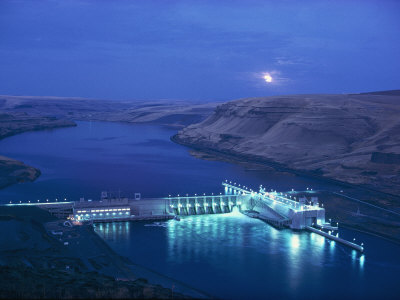forum
library
tutorial
contact

Breaching Dams Won't Work
by Abel WorkmanLewiston Tribune, November 10, 2022
|
the film forum library tutorial contact |

|
Breaching Dams Won't Workby Abel WorkmanLewiston Tribune, November 10, 2022 |
 With no known proof of what will happen, environmentalists want to take out the lower Snake River dams because they think it will bring back fish numbers. They should use some common sense and look at the following:
With no known proof of what will happen, environmentalists want to take out the lower Snake River dams because they think it will bring back fish numbers. They should use some common sense and look at the following:
They say wind and solar will work, again with no proof. So far, wind and solar only cost us a lot of money with very, very little return.
I foresee high maintenance costs with bird and bats being killed by wind towers.
Related Sites:
Comments on the NWPCC Amendment Process, Kintama Research, 4/4/08 (excerpt below)
"Survival of Migrating Salmon Smolts in Large Rivers With and Without Dams"
PLoS Biology
April 4, 2008
by Welch, D.W., E.L. Rechisky, M. Melnychuk, A.D. Porter, C.J. Walters, C. Schreck, S. Clements, B.J. Clemens, and R.S.McKinley.
Kintama Research Corporation,
10-1850 Northfield Road, Nanaimo, B.C. Canada V9S 3B3
Phone: (250) 729-2600 * Fax: (250) 729-2622
e-mail: david.welch@kintamaresearch.org (excerpt)There are many important policy questions whose effectiveness is directly tied to questions of measuring relative salmon survival in both the ocean and freshwater; I conclude by re-iterating some of them here:
- Is survival in the ocean higher or lower than survival in the hydrosystem, for smolts of a given size?
- If survival is poorer in the ocean, then expensive transportation programs may not be effective in attaining their intended goal of boosting adult returns.
- If survival is poorer in the ocean, then arguments that reducing reservoir levels to minimum operating pool levels to speed smolt migration rates may not be effective.
- Is freshwater survival in the Columbia hydrosystem significantly reduced by the presence of dams relative to either other river systems (e.g. the Fraser) or the lower Columbia, both of which lack dams?
- If not, then hydropower and salmon conservation may not be as incompatible as had previously been thought.
- If not, then further efforts to improve salmon survival at the dams may realize little benefit--but cost a great deal because of diminishing returns.
- If not, then the impact on survival of other factors (such as predators) needs to be better assessed, requiring a clear understanding of where and when this mortality occurs.
- Are there periods of time when ocean survival is better?
- If the timing of plankton blooms or predator presence is changing because of climate change, then strong natural selection may be occurring to select for different run-timing characteristics than in the past.
- If survival is better at certain times in the ocean, then salmon returns might be boosted by transport and hatchery release programs keyed to release smolts at that time (or, more radically, by modifying rearing strategies and changing the genetic make-up of the fish) to have smolts reach the ocean at the most favourable times.
learn more on topics covered in the film
see the video
read the script
learn the songs
discussion forum
